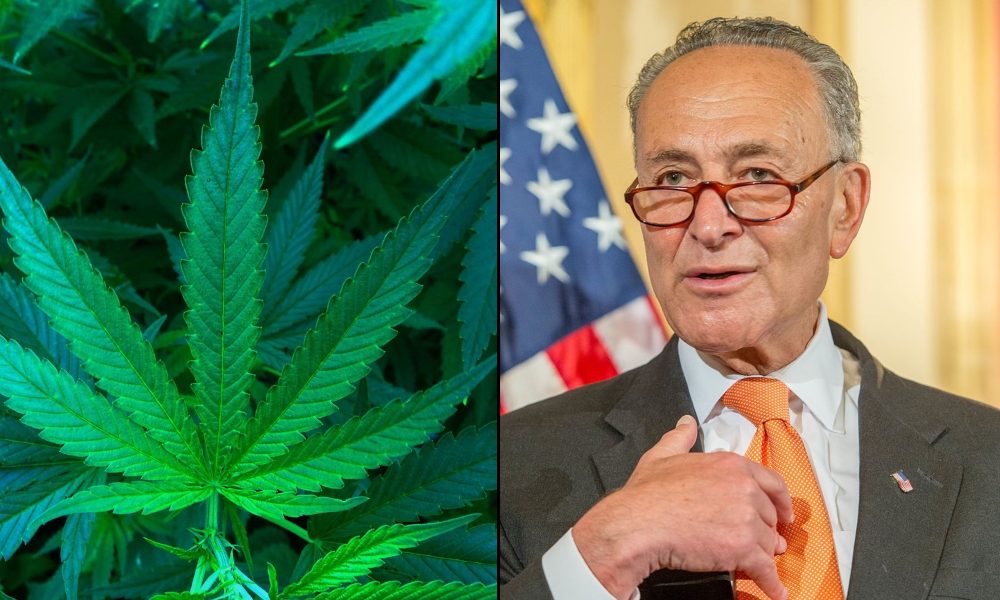Senate Majority Leader Chuck Schumer (D-NY) says lawmakers will “hit the ground running” in 2024, aiming to build on bipartisan progress on several key issues, including marijuana banking reform—though he noted it “won’t be easy.”
As the Senate recesses for the holidays, Schumer delivered a floor speech on Wednesday touting the chamber’s 2023 legislative achievements, while emphasizing that “there’s a lot we must do” in the second half of the 118th Congress.
Senators “made large progress in a bipartisan way on new parts of our agenda,” Schumer said, adding that the same bipartisanship will be “essential in a divided government” to pass additional priority legislation such as the Secure and Fair Enforcement Regulation (SAFER) Banking Act that stalled out this year after clearing the Senate Banking Committee in September.
He listed “SAFE Banking and cannabis reform” alongside other top 2024 priorities such as bolstering economic competitiveness with China, promoting railway safety and addressing youth online privacy issues.
Watch the majority leader’s floor speech on 2024 legislative priorities in the video below:
“In each of these, we have laid some groundwork with bipartisan support,” Schumer said. “It won’t be easy, but we want to get these things done in 2024.”
He stressed, however, that “bipartisan cooperation” is critical with a Democratic-controlled Senate and GOP majority House. That dynamic has also factored into the SAFER Banking Act, contributing to its delayed consideration on the Senate floor.
Throughout the year, Schumer has reiterated his intent to expeditiously move the incremental reform, earlier versions of which have cleared the full House in some form seven times in recent session. But even though bipartisan senators negotiated a revised version that advanced through the Banking Committee over the summer, the bill did not make it to the floor by the year’s end as the leader had planned.
Part of the problem was persistent disagreement over certain provisions of the SAFER Banking Act, particularly one section favored by Republicans members that concerns broader banking regulations. Timing constraints also forced lawmakers to consolidate their 2023 work.
Also, as Schumer alluded to during his new floor speech, passing any legislation in a divided Congress requires bipartisan coordination, and the marijuana banking bill’s prospects in the House became fuzzier in the fall amid a leadership upheaval that led to the ouster of then-Speaker Kevin McCarthy (R-CA), who’s supported the modest reform, and ascendance of anti-marijuana Speaker Mike Johnson (R-LA).
The Senate majority leader said on Wednesday that the GOP House became the “most unproductive and dysfunctional in modern history” due to its refusal to “embrace bipartisanship.” That dysfunction, he said, “can be boiled down to three words: chaos, extremism, paralysis.”
But while there might be open questions about how the House would navigate cannabis banking reform, the fact remains that the Senate bill has yet to reach the floor under Schumer’s control. And the majority leader said last month that the reason for the delay comes down to insufficient GOP support in his chamber—a claim disputed by the Republican sponsor Sen. Steve Daines (R-MT), who has repeatedly argued the votes for passage are already there.
Daines has suggested that the key question at this stage is whether the measure has enough support to pass the House. He said in October that senators were working with their House counterparts “to get alignment between both of the chambers.”
If the SAFER Banking Act does make it to the Senate floor next year, it’s expected to be amended. For example, Schumer has discussed the “moral responsibility” of further amending it to add provisions on state-legal cannabis expungements and gun rights for cannabis consumers.
For what it’s worth, newly released survey data reveals that 71 percent of top Capitol Hill staff feel it’s “unlikely” that lawmakers will pass any type of cannabis reform, including the banking legislation, in the 118th Congress that ends this time next year.
Pennsylvania Lawmakers Approve Bills To Protect Medical Cannabis Patients From DUI Charges
Read the full article here

